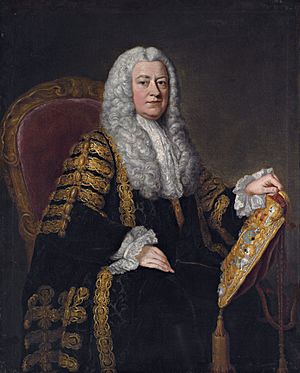Yorke–Talbot slavery opinion facts for kids
The Yorke–Talbot slavery opinion was an important legal statement made in 1729. It was written by two top government lawyers in England. This opinion discussed whether slavery was legal under English law at that time.
Contents
Why Was This Opinion Needed?
Before 1729, some judges had different ideas about slavery. One judge, Lord Chief Justice Holt, made decisions that worried slave traders. He suggested that enslaved people might not be seen as "property" in the eyes of the law. This meant that slave owners might not have strong legal rights over them.
Slave traders were especially worried about two things:
- Could enslaved people who became Christian be set free? Many enslaved people were getting baptised and then claiming they were free.
- Were there any strong legal rights to own an enslaved person at all?
Because of these worries, slave merchants asked for a clear legal opinion. They wanted to know if their ownership of enslaved people was truly legal in England.
Who Wrote the Opinion?
The opinion was written by two very important lawyers:
- Sir Philip Yorke, who was the Attorney General.
- Charles Talbot, who was the Solicitor General.
These roles meant they were the main legal advisors to the King and government. Both men later became Lord Chancellor, which is the highest legal position in England. Even though it was just an opinion and not a court ruling, it was taken very seriously by slave owners. They used it to argue that slavery was legal in England.
What Did the Opinion Say?
Yorke and Talbot gave their legal opinion on three main points:
- An enslaved person's status did not change just because they came to England. They were still considered enslaved.
- An enslaved person could be forced to go back to the colonies from England.
- Becoming Christian through baptism would not make an enslaved person free.
They wrote: "We are of opinion, that a slave coming from the West-Indies to Great-Britain or Ireland, with or without his master, doth not become free... and that baptism doth not bestow freedom on him... We are also of opinion, that his master may legally compel him to return again to the plantations."
This opinion did not explain why they came to these conclusions. It also did not mention earlier court cases that suggested England was "too pure an air for a slave to breathe in." However, the opinion was published widely and used for nearly 40 years to support slavery in England.
What Happened After the Opinion?
Sir Philip Yorke, after becoming Lord Chancellor, supported the ideas from the opinion in a court case in 1749. This made the opinion seem even more official.
However, things changed in 1772 with a famous court case called Somersett's case. An enslaved man named James Somersett had escaped in England. His owner tried to force him back to the colonies. Lord Mansfield, another important judge, ruled that no one could be forcibly removed from England as an enslaved person.
This ruling was a big step. But Lord Mansfield was careful. He did not say that slavery was illegal everywhere in the British Empire. He only said that enslaved people could not be forced out of England. He knew that ending slavery suddenly would cause huge problems in the colonies.
Finally, slavery was completely abolished (ended) by law in England and all British colonies. This happened with the Slavery Abolition Act in 1833.
See also
 | Isaac Myers |
 | D. Hamilton Jackson |
 | A. Philip Randolph |


